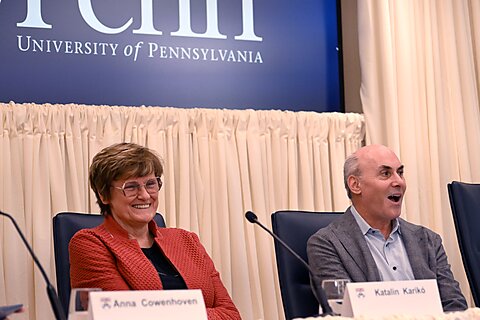This week Katalin Karikó and Drew Weissman received the Nobel Prize in Physiology or Medicine for their discoveries that led to the development of mRNA vaccines used against COVID-19. Moderna and Pfizer‐BioNTech produced those vaccines, saving millions of lives and helping to reopen the world. According to the Nobel Assembly, the awardees “contributed to the unprecedented rate of vaccine development during one of the greatest threats to human health in modern times.”
I celebrated that achievement in my column in El Comercio (Peru) this week, reposted here, by reviving a great article that Scott Lincicome wrote in December of 2020 just as the vaccines were about to come online. The COVID vaccines, Scott rightly pointed out, were a triumph of globalization.
The much‐deserved Nobel Prize to Karikó and Weissman highlights that truth. As I wrote:
It was the flow of people, ideas, capital, goods and services that made it possible to discover and produce a vaccine in record time…
First, [this is a story] about immigrants. Karikó is Hungarian and went to work in Philadelphia, where she met Weissman at the University of Pennsylvania. Her work there, however, was undervalued, so Karikó went to a job at BioNTech. This German‐based company was, in turn, founded by a Turkish immigrant and a German woman of Turkish descent. Pfizer, founded in the 19th century by German immigrants to the United States, collaborated with BioNTech to produce the vaccine. Its CEO is a Greek immigrant to the United States.
Moderna’s co‐founder and chairman of the board, meanwhile, is of Armenian descent, born in Lebanon and immigrated first to Canada and then to the United States. The company’s other executives, like those at Pfizer, hail from numerous countries.
Global capital markets also played a role by providing the massive funding needed for the biotech and pharmaceutical companies that developed and distributed the vaccines. When Chinese researchers publicly shared the genetic map of the virus in early January 2020—without seeking permission from the Chinese authorities—the international scientific community also played a role, immediately getting to work on creating possible COVID tests and vaccines.
The production and distribution of the vaccine required complex international collaboration in terms of logistics, shipping, storage, and supply chains that were adaptive but based precisely on the knowledge, technology, and networks built up by decades of global commerce.
None of the above could have been accomplished by a preconceived government plan. The production and distribution of the vaccines really were a triumph of globalization.
Read my article in Spanish here, or, better yet, read Scott’s longer article on which it is based, here. For a more complete view of the blessings of globalization at a time during which it is coming under attack by both the left and the right, see the essays in Cato’s new project, “Defending Globalization.”

